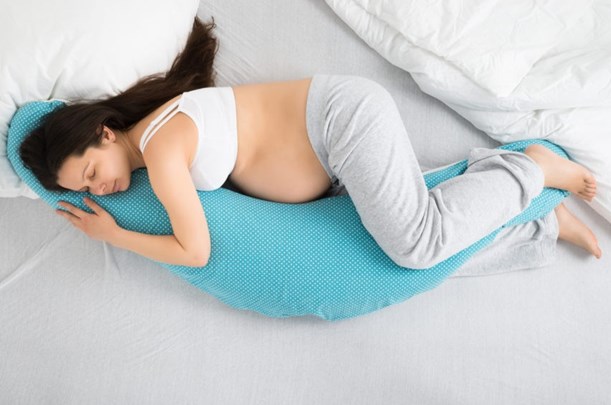Tips to Help You Sleep Better When You Are Pregnant
If you are like many women, pregnancy is real joy – you are looking forward to meeting your newborn, and you feel a sense of profound responsibility to take care of the child. However, the joy of pregnancy can be quickly overshadowed when you find you cannot sleep well because of the growing fetus, and your body is also experiencing a strain because of carrying the baby.
As the pregnancy progresses, especially in the second and third trimesters, it becomes a pain to go to sleep. You are getting a bigger belly, the baby is kicking strongly, and you have to get up twenty times in the night to go to the bathroom. However, take comfort in the fact that you are not alone – many women experience this kind of discomfort during this phase. Here are some tips to help you deal with it, and sleep better.

Naps are a bad idea
It is normal to feel sleepy during the pregnancy, especially in the first trimester. However, a nap will make it harder for you to sleep at night because it takes away some of the sleep that builds up in the daytime.
When you think about it, it is similar to snacking. When you eat a small amount of food before a meal, no matter how insignificant it looks, it takes away your appetite.
Eliminate your sleep debt
The lifestyles of today means that numerous women get into pregnancy when they already have sleep debts, because you are sleeping five to six hours a day. The good news though is that you can repay that debt and establish a balance in your body in the early pregnancy stages, before the pregnancy progresses and makes it hard to sleep.
To stay away from the napping habit, go to bed an hour earlier than usual – and stick to that routine regularly. For instance, if you usually go to bed at 10pm, start going at 9pm. You may have to sacrifice somethings, such as your favorite TV show – but it is better for your health in the long term. In fact, a study by the University of California found that women who sleep less than six hours raise their risk of a C-section by four times, and their labor can increase by up to ten hours.
Buffer your stress levels and address anxiety

You may not hear this much, but stress and anxiety have very real implications on your pregnancy. In fact, higher stress and anxiety levels lead to prolonged labor when the time for delivery comes, and that is a bad idea on your end.
According to sleep researchers, increased levels of anxiety and stress lead to fatigue, which means that the muscles responsible for the labor process are tired. Ifyou are losing your sleep because of your new role as a mother, or you are worried about the baby, or millions of other things you might be worried about, then your labor process will be unnecessarily long and painful because of tired muscles.
If you need to, book an appointment with a therapist that can help you deal with your issues, and talk to friends and family to let them know how you feel. Spare yourself the pain, and make sure you rest well for an easier entry into motherhood.
Pillows are your best friends

As the pregnancy progresses, you will need plenty of extra support for your back, and not just using a premium mattress such as the famous IKEA mattress – regardless of the position you lie in. you can start with full-length body pillows, then utilize smaller pillows for extra support.
Regardless of where you place the pillows – under your head, back, arms, between the knees, or baby belly – find a position that works for you and stick with it.
Do not worry about your dreams
Do you experience nightmares when you are pregnant? While this does not apply to all women, many experience it – according to a Canadian study, as many as 59 percent. These dreams mainly involve the baby being in some form of danger. However, you do not need to worry about them, as they might be due to the maternal instinct to protect your baby – you can relax and go bac to sleep.
Use essential oils and herbs, especially lavender
Some pillows are filled with fragrances, particularly natural lavender that is a natural laxative. If you do buy these pillows, follow the package instructions, and use it whenever you are in pain or need to sleep. If not, there are plenty of packages that you can buy for essential oils, and use them when you go for a bath, and when you want to relax before bed.
Reduce liquid intake after 4pm

When you are training a child for their potty training, you know that you let the child drink the liquids they need until around 4 o’clock, then afterwards give them liquids only when they ask for them – and you give them in quarter cup amounts. This helps them rest through the night without waking up to go to the bathroom, and will reduce the problem of bed wetting.
The same solution applies to a pregnant woman, and it is mostly because many women do not take the time to stay hydrated throughout the day, so they choose to drink in the evenings. However, this messes up your sleep schedule, and forces you to wake up more often at night.
A better approach would be carrying a large water bottle with you to work, so that you drink the whole day; and make sure you finish it before you leave work in the evening.
Warm water for a bath
Before getting into bed, have a warm bath, as this will help you relax. Avoid hot water, as certain studies have shown that it increases vasoconstriction (contraction of blood vessels), which increases your chances of miscarriage.
Final thoughts
When you are pregnant, never forget to take care of yourself. It is very important to rest as much as you can, so these tips will hopefully help you sleep better and ease your pregnancy period, for you and the baby.
